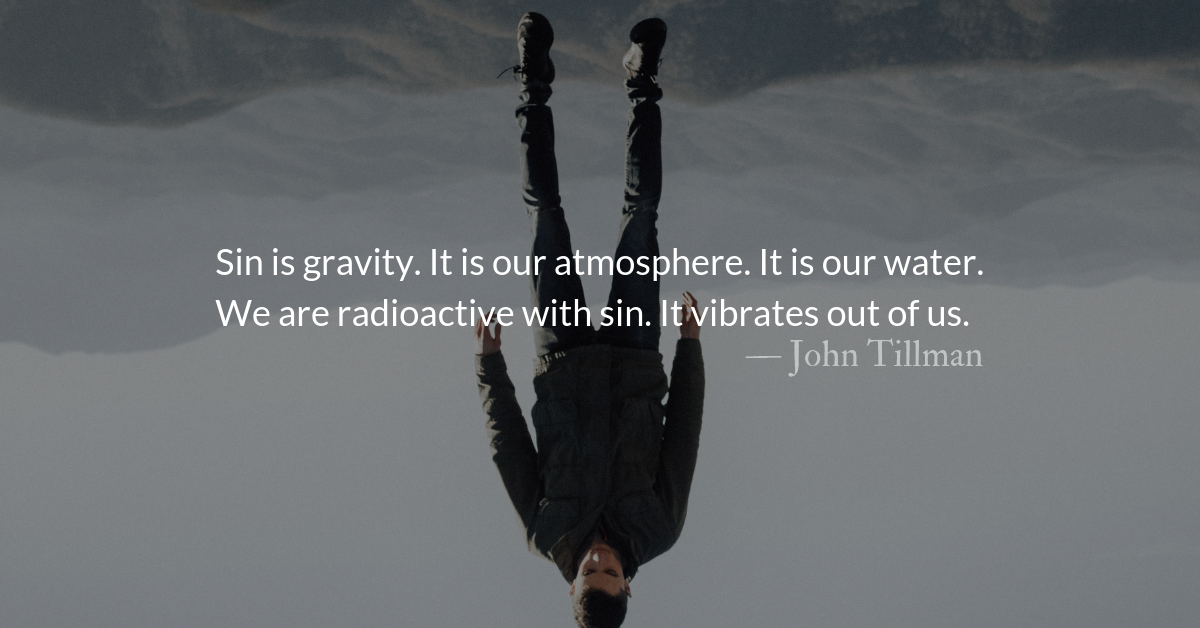John 9.34
“You were steeped in sin at birth; how dare you lecture us!”
Reflection: Steeped In Sin
By John Tillman
The Pharisees are partially correct in the above passage; the formerly blind man, was steeped in sin at birth. Where the Pharisees were in error was denying that they were also steeped in sin.
There are two ways of thinking about sin. One sees sins as individual actions. In this calculation, we total sins up, like fines in a legal system. We interpret sins as individual, unconnected actions that are less than perfect good.
This is the mode of sin evaluation favored by the Pharisees and many modern Christians. We prefer to think about sin in this manner because it is measurable and allows us to look at ourselves in comparison to others. No matter how bad we are, we can always find someone who makes us look good by comparison.
This thinking also leads us, like the Pharisees, to see those in difficulty or hardship as suffering from their own sin and wrongdoing. This allows us to further exclude and punish them while absolving ourselves from any responsibility to help them. Today, many view the poor through this lens, seeing generational poverty as the fault of the poor, and the community’s responsibility as minimal or non-existent. This view of the poor can’t be found anywhere in scripture—except perhaps in the views of the Pharisees.
Sin is not just some bad things that we sometimes do. Sinful actions are “sins” but sin is more than actions. It is a condition. It isn’t just a condition that we live with. It’s a condition that we live in. Paul tells us that creation groans to be released from sin, and we feel its effects. Sin is pervasive. It seeps into every crack and corner of our souls.
Sin isn’t like a disease, a condition inside our bodies, as much as it is like an environmental condition, an inescapable influence that surrounds and penetrates us.
Sin is gravity. It is our atmosphere. It is our water. We are radioactive with sin. It vibrates out of us in ways that damage and harm us and anyone we come near.
We need Jesus not to help us make better choices and “sin less.” We need Jesus because only his righteousness is the antidote to the radiation poisoning of rebellion.
We can blind ourselves, like the Pharisees, refusing to see our sin. Or we can admit our former blindness and seeing Jesus, we can say as the formerly blind man did, “Lord, I believe.”
Prayer: The Morning Psalm
The eyes of the Lord are upon the righteous, and his ears are open to their cry. The face of the Lord is against those who do evil, to root our the remembrance of them from the earth. — Psalm 34.15-16
Today’s Readings
Exodus 30 (Listen – 5:06)
John 9 (Listen – 4:56)
Thank You!
Thank you for reading and a huge thank you to those who donate to our ministry, keeping The Park Forum ad-free and enabling us to continue to produce fresh content. Every year our donors help us produce over 100,000 words of free devotionals. Follow this link to support our readers.
Read more about Suffering and Sin
We feel less responsible for problems in the world when we can believe that only the lazy are poor, only the promiscuous are in danger of sexual assault or disease, only hedonists become addicts, and only nihilists suffer depression or have suicidal thoughts.
Read more about The Focus of Christ’s Anger
Jesus spent time with people who, by every cultural definition and religious law, would be under God’s wrath. Sinners. Heretics. Financial swindlers. Race traitors. Fallen women. Lepers. Foreign occupiers. Shouldn’t Jesus have been angry with them?







